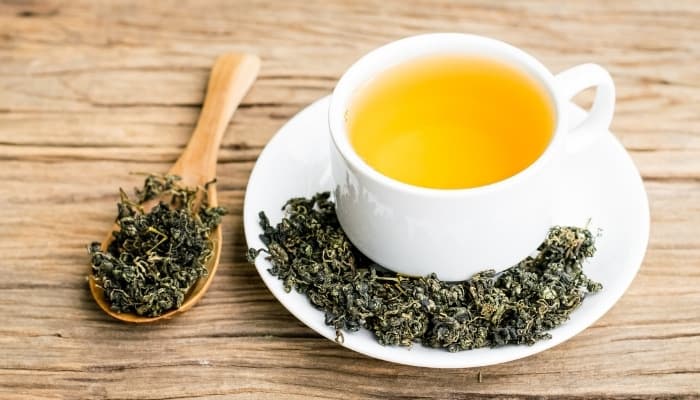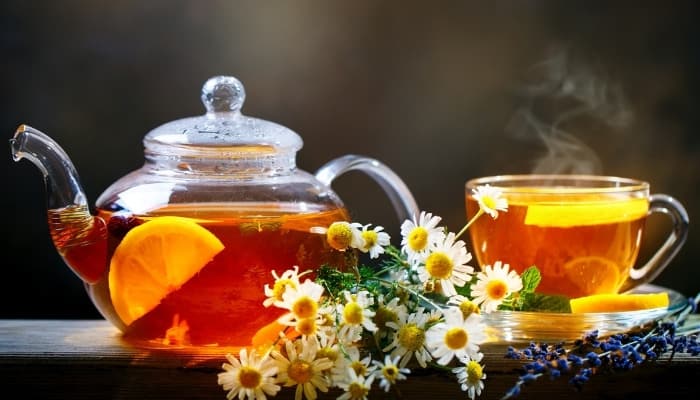If you are a beginner in gardening or have experience with cultivating plants, chances are you have seen online discussions about using tea for plant care.
The truth about using tea for plants is a bit surprising.
Is tea good for plants? Tea is naturally high in tannic acid and nitrogen, which helps fertilizes the soil in which your grow plants grow. Even “watering” your plants with leftover tea hydrates and generally helps nourish your plants. Tea also increases growth rates and root development as well.
Read on below and learn all about tea for plants, including when using it can help and when it can hurt!
Tea for Plants
Using tea for plants is an excellent way to keep them hydrated and their soil well fertilized. Tea provides not only water, nitrogen, and manganese but a nice dosage of macro and micronutrients as well.
One downside is that tea also contains aluminum and fluoride.
We know that these are not beneficial for humans to drink and ingest in large amounts, and in large dosages, these may actually stunt plant growth.
Nutrients in Tea
Polyphenols are the most concentrated nutrients associated with tea, along with much-needed nitrogen.
The type and amount of nutrients present in tea depend on what type of tea you’re using as they aren’t all one and the same.
Potassium, calcium, phosphorus, magnesium, manganese, copper, and zinc are also found in tea – all essential nutrients for healthy and thriving plants.
How Does Tea Affect Plant Growth?
Thanks to minerals and trace amounts of nutrients, both macro and micro, tea helps plants grow quicker and healthier.
Giving your plants tea to drink is basically the same as giving them water that is infused with nutrients.
What Plants Benefit From Tea
Generally speaking, most plants benefit from a bit of tea, though some more than others. The list of plants that benefit the most from tea includes:
- African violets
- Azaleas
- Begonias
- Berries
- Camellias
- Daffodils
- Easter lilies
- Ferns
- Heather
- Hydrangeas (blue)
- Orchids (not all)
- Oxalis
- Philodendrons
- Poinsettias
- Rhododendrons
- Roses
- Rubber plants
- Shrubs
- Spider plants
- Most vegetables
- Most herbs
- Many flowers
- Many fruits
Which Plants Do Not Like Tea
Not everything that glitters is gold, and thus, not all plants enjoy a spot of tea as much as others do. In fact, some plants flat out do not benefit from tea in the way that others do.
The top 15 plants that don’t like tea include:
- Baby’s breath
- Boston ivy
- Cactus
- Carnations
- Chrysanthemums
- Dahlias
- Daisies
- Geraniums
- Hibiscus
- Hydrangeas (pink)
- Iris
- Marigolds
- Peonies
- Poppies
- Sunflowers
What Type of Tea To Use for Plants
Just about any sort of tea that you can brew can be used for watering your plants and fertilizing their soil. From leftover tea to green, black, and herbal mixes, they all have their benefits.
In the following sections we discuss the main types of tea that are best for using with plants.
Is Leftover Tea Good for Plants?
Yes, leftover tea is good for plants. Even though you are done drinking it because it’s watered down, is lukewarm, or has lost its flavor from sitting in the fridge too long, it is still perfectly good for plants.
There are still plenty of nutrients and other good stuff in leftover tea, aside from being a basic form of hydration, for plants.
If you have added any sweetener to your tea, it’s best not to use it for plants as sugar can be detrimental to plants in general.
Tea Leaves for Plants
Raw tea leaves are great for feeding your plants. They contain nitrogen in high amounts as well as all types of other nutrients in trace amounts as well.
They work well for everything from tropical plants to garden vegetables and house plants.
Green Tea for Plants
Green tea in liquid form is as healthy and beneficial for plants as its counterparts. It is used mostly as an organic fertilizer for plants, inside and out.
Roses, ornamental bushes, blueberries, and tomatoes benefit the most from raw green tea leaves.
Black Tea for Plants
As with normal tea and green tea, black tea also contains tannic acid and a variety of nutrients for plants. It can be added to plants in liquid form or dried and ground up.
It works well with a wide variety of plants including tropical plants, house plants, and vegetables.
Herbal Tea for Plants
Chamomile, comfrey, willow, and just about any other organic herbal tea are excellent for plants. It hydrates them, boosts the nutrients in their soil, and more or less gives them a quick pick-me-up.
That said, each herbal blend has a different list of ingredients and works better for certain types of plants than others.

Effect of Caffeine on Plants
Caffeine is known for having an overall negative effect on plants.
The main drawback of giving caffeine to plants is that it causes the root systems of plants to slow their development, eventually stunting their growth.
That said, it’s also important to note that a small number of plants have shown rapid growth when caffeine was added to their soil.
Watering Plants With Tea Pros
There are several advantages to watering plants with tea. A few of the most significant ones are:
- Stimulates new growth
- Boosts leaf production
- Increases root development
- Hydrates plants
- Delivers trace nutrients
- Fertilizes the soil
- Promotes general well-being of plants
Watering Plants With Tea Cons
The disadvantages of watering plants with tea aren’t all that bad considering the benefits:
- Potential overwatering
- A buildup of heavy metals like aluminum
- Slow growth if given too much tea
It is important to note that all of the cons associated with watering plants with tea are quite easily avoided by simply using tea in moderation.
How To Use Brewed Tea on Your Plants
There is no real right or wrong way to use brewed tea on your plants.
That said, the most common way to apply brewed tea is simply to make it one day, let it sit overnight, and then water your plants with it as if it were normal water.
How To Use Tea Leaves on Your Plants
There are a few main ways to apply tea leaves to your plants:
- Layer the leaves on the soil near the base of the plant.
- Throw the leaves into your compost and let them become organic compost to amend your plant’s soil.
- Add them to leftover tea and water your plants with them regularly.
Related Questions:
Are Tea Leaves Good for Compost?
Tea leaves are an excellent addition to your compost pile/bin. When they break down, they add plenty of micro and macronutrients as well as much-needed nitrogen into the compost.
Do Tea Bags Repel Insects?
Tea bags keep plenty of insects away from your plants, but they are not a guaranteed remedy. That said, they do well against ants, spiders, and some mites.
Adding mint to the mix is a great way to increase the potency of this organic pest-control solution.
Conclusion
Using tea for plants is a creative, organic way to hydrate and boost your plant’s growth as well as fertilize its soil at the same time.
However, using it too often may lead to undesirable side effects in your plants, like stunted growth.
Furthermore, not all plants appreciate tea as much as others, which is why you need to know which of your plants to give tea to and which ones to avoid watering with tea.

